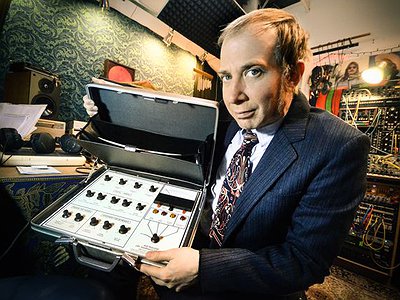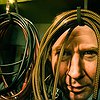Thanks to developments in the realm of software, DJing, playing live and producing have moved closer together than ever before, allowing DJs to change a track down the tiniest detail. In which way are you making use of these possibilities in your sets and in which way, do you feel, does the music benefit from them? Do you feel a crowd is actually able to appreciate the intricacies of complex DJing, if they don't actually know what, precisely, is happening behind the decks?
I really enjoy the looping functions on CDJs and the built in FX in most DJ mixers these days, but I don’t go too far in creating brand new music. I rather just use them to enhance my set. I think DJs can go too far with the technology – it’s so easy to beat match, pitch shift and time stretch that just about any two records will mix together, whether they sound good or not.
The relationship with the audience is crucial for a DJ, and yet it seems to be a fragile one. How do you see the balance between giving the crowd what they want and treating them to something new? Do you believe in the possibility of "reading an audience" – and how do you put it into practise? Is the relationship with the dancers a collaborative one or, as Derrick May once put it, a “battle”?
Ha! Well, it can be both a battle and a collaboration at times. It’s the tension between the two that keeps things interesting. Yes, it is absolutely possible to read a crowd but it would be hard for me to say how I do it or how it effects my DJing, it’s something that happens without me thinking about it.
Could you try to describe what makes you decide to play a particular record during one of your sets? What makes a strong transition from one track to the next from your point of view, for example, and how do you see the relative importance of establishing a flow versus creating tension through suspenseful breaks in continuity?
These days I like to play songs all the way through, with minimal mixing between tracks, but a DJ can develop an intuitive sense of tempo and key, which can make the transitions smooth. Decisions that I make during a set are basically unconscious, I’m just being open to the music and to the room and seeing what happens.
A strong set can be truly be more than the sum of its parts. How, do you feel, is the music transformed in the hands of a DJ? In which way are you actively trying to create an experience that is more than just stringing together a few excellent records?
The experience emerges from the music – it’s not something that I’m trying to impose “from above”, I’m just listening to where the music is going. It’s all very Zen.
DJs that just press play on their laptop may have given technology a bad name, but without technology, there'd be no DJing in the first place. What's your perspective on the relationship and the balance between technological advances, music and the art of DJing? In which way have particular technologies perhaps concretely changed your style of DJing? Do you believe in the idea of progress in DJing?
My personal bugbear is the way that Serato etc has introduced a great deal of impatience into DJs sets. With so much music available immediately everybody seems to be in a hurry to get to the next “hit”, whatever that might mean in the context of your set. I’ve heard DJs that I think are incredible when they’re using vinyl and/or CDs but become predictable and uninteresting with Serato.
People are often speaking about the demise of the club scene, but the experience has remained as potent as ever. Why, do you feel, has the club remained such a great place for the discovery and appreciation of electronic music? How do you see the relationship between music and the space it is performed at?
Space is central to the appreciation of any art, and dance music is of course going to mean a lot more on a dance floor than anywhere else.
In how much, do you feel, is the club experience shaped by cultural differences? Do you, when travelling, take these cultural differences into consideration – and in how far has your approach as a DJ perhaps even benefited from playing in different countries and in front of different crowds?
What sounds exotic in NYC can sound cheesy in Brazil, and top 10 hit singles in the UK are underground hipster anthems in Australia. It’s a mine field out there!
Please recommend two DJs to our readers which you feel deserve their attention.
Thomas Bullock (of Rub & Tug)
Dougie from the Joy parties in NYC.
Check out what Tim Lee gets up to at Tummy Touch Records www.tummytouch.com



